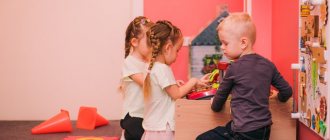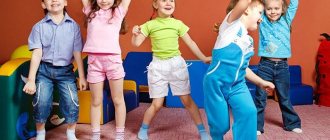Rules for effective children's communication
- As soon as the baby turns 1 year old. You should begin to develop his communication abilities. Before this, he could only manage to communicate with family and close family friends. Now he needs a wider circle.
- Teach your child to say his name when meeting someone. When he does this several times, this behavior will become familiar and natural to him. Encourage attempts to meet other children on the playground.
- When you go out for a walk, invite your child to ask how the boy or girl you met last time is doing. It is enough for the children to say a few phrases to each other. After this, they will willingly greet each other, and then talk and play together, which can later develop into friendship.
- When you go shopping with your preschooler, ask him what he would like to buy. Ask him to tell the seller about his choice. If he cannot do this due to uncertainty or shyness, you should not scold him. This way you will only make the situation worse. It is better to try to do the same after some time. Before this, you can prepare the child for this, teach him how to make purchases. The same actions need to be done in other public institutions where communication skills are needed.
- Children on the playground and in the garden often quarrel and sort things out. At the same time, some parents immediately rush to separate their babies. But this is not entirely correct. Sometimes children need to be given time to find ways to resolve conflicts on their own. But if the situation gets out of control, it is simply necessary to intervene. It is necessary to talk with your child about the fact that there is no need to conflict over trifles, and that every dispute should be resolved with dignity.
- If the child is 3-4 years old, it is still quite possible for him to make comments while walking. If he has already reached school age, all conversations should take place only at home. The same applies to choosing friends. Very young children can be told who they should meet and who they should not. The student must choose his friends himself.
- It is very important to explain to your child the rules of behavior and etiquette. It is important that he understands how to communicate with adults and how with other children. The rule should be explained gradually and unobtrusively, reinforced with examples.
Game-based learning
Communicative development in preschoolers occurs during play. It is very important that the gameplay is beneficial and helps develop the necessary skills. During the game, the child learns to understand the underlying motives of behavior and masters basic human communication skills.
Games should be varied and diverse: this contributes to the development of a harmonious personality that will successfully navigate social interaction.
To develop social and communication skills in preschool children, you can use the following gaming techniques:
Act out scenes from fairy tales. In this case, you can either use toys or turn into actors for a while. For example, you can act out the plots of Russian folk tales: they are quite instructive and provide a lot of food for discussion and thought. After the game, be sure to discuss with your child why the characters behaved in a certain way, for example, did not listen to their elders, and what consequences such behavior led to.
Offer your child different situations to discuss. For example, ask him what he would do if he wanted other guys to accept him into their game. Discuss several options for behavior, arrange small impromptu “role-playing games”. Let the child tell you how to behave in such a case, and how not to.
The following exercise is suitable for developing empathy. Invite your child to imagine that he is in a magic store, in which you will play the role of the seller. Let the child choose gifts for his relatives and friends. It could be anything: from a new car to a bouquet of flowers. The main thing is to ask the child to motivate his choice. This game will help you develop a very important skill: the ability to step into another person's shoes and imagine their needs and expectations.
Advice: try not to raise your voice at your child. Any situation can be resolved peacefully: it is important that the child knows how to negotiate, and not get his way by force.
Social development of preschool children
Extensive research in recent years shows the relevance of the problem of the social development of the child and the relevance of pedagogical management of this problem.
Many famous teachers and philosophers pointed out the need for early socialization of the child. The problem of personal socialization in the history of Russian pedagogy has always been relevant, as evidenced by the studies of such famous teachers as V.S. Muchin, who considered identification and separation of personality as mechanisms of socialization, A.P. Petrovsky, who studied the natural alternation of stages of adaptation, individualization and integration in the process of personality development. Significant researchers in the field of domestic child psychology and pedagogy have one way or another dealt with this issue in connection with the general course of the physiological, psychological, social and personal development of the child and his individual characteristics. In the works of G.A. Berulava, P.Y. Galperin, V.V. Davydov, N.F. Talyzina argue that personal development cannot be carried out independently, it must be influenced purposefully by creating psychological and pedagogical conditions - through the content of educational subjects and appropriate technologies and methods for this. If we turn to the works of modern teachers and psychologists, we will also notice great interest in the issues of social development of the preschool child in different directions. S. Meshcheryakova points out the communicative aspect of children’s communication with the adults around them, which is also important for the development of social competence. The mental development of a child largely depends on how his communication develops with the adults around him. It is very important for parents and educators to know how communication occurs and develops between a child and an adult and how communication affects mental development.
It is also noted that the environment should be considered as an opportunity for the most effective development of the child’s individuality, taking into account his inclinations, interests, and level of activity, which contributes to his successful socialization.
Socialization is the process of personality formation. The essence of socialization is manifested in the processes of adaptation, integration, self-development and self-realization. Socialization is an ongoing process throughout life.
The main result of effective socialization, according to most scientists, is to instill in students the desire to become productive members of society, familiarity with rights, social roles and responsibilities, good adaptation to the social environment, and integration into society.
As criteria and indicators of socialization, it is proposed to use the child’s attitude to society, socially significant activities, the degree of activity of the life position, the individual’s focus on the subject of social relations and the degree of formation of social experience.
Socialization is a multidimensional process during which a person joins the “universal social” and constantly rediscovers and asserts himself as a subject of social culture. The socialization of preschool children occurs in multidirectional activities of appropriating the world of objects and the world of relationships between people.
Socialization occurs both during the spontaneous influence of social factors and in a purposeful, organized process. The socialization of preschool children is determined by various bases of social identification, which are dominant at a certain age: Preschool age - species and generic identification.
A preschool educational institution as a socio-pedagogical system is part of a social educational institution and, as an initial stage, deals with the problems of child development and resolves issues of early socialization of children.
Family influence on the communication skills of a preschooler
The family is the most significant social structure for young children, where communication skills with others are formed. In order for a child to understand the importance of social interaction and acquire effective communication skills, the following rules should be followed:
- Set a positive example. If parents talk to each other in front of the child, and do not each do their own thing, the baby will actively follow the example of mom and dad.
- Talk to your child. Even recently born children respond to speech addressed to them. Parents should contact the baby, comment on their actions, and read fairy tales aloud. When a child learns to talk, it is very important to discuss with him the impressions received during the day, ask questions that require a detailed answer, etc. The latter is very important: parents must learn to formulate questions in such a way that the child cannot limit himself to simple answers like “yes.” " or not".
- Read fairy tales to your child, followed by a discussion of the motives behind the characters’ behavior. Ask as many questions as possible: “Why did the hero behave in a certain way?”, “Why did the hero fail to achieve his goal?”, “What would you do if you were the character?” etc..
- Encourage your child to socialize with peers. Developmental groups, playgrounds and children's clubs contribute to the rapid development of communication skills. Isolation of a child can cause serious problems with adaptation to a team in the future;
- Do not try to fulfill the child’s “non-verbal” requests. Give him the opportunity to explain what he wants. Many parents try to anticipate the child's needs before he has time to utter a word. This greatly inhibits communicative development: let the baby tell you what he wants. In the early stages, it can be one word, for example, “water”, “doll”, “ball”. When the child masters speech better, teach him to formulate detailed requests to others.
- Gently explain that some forms of communication behavior are socially unacceptable. For example, if a child demands to give him a toy without saying “please,” say that this is impolite.
Tip: When reading, choose fairy tales and stories whose characters interact with each other. This will allow the child to better master communication skills.



